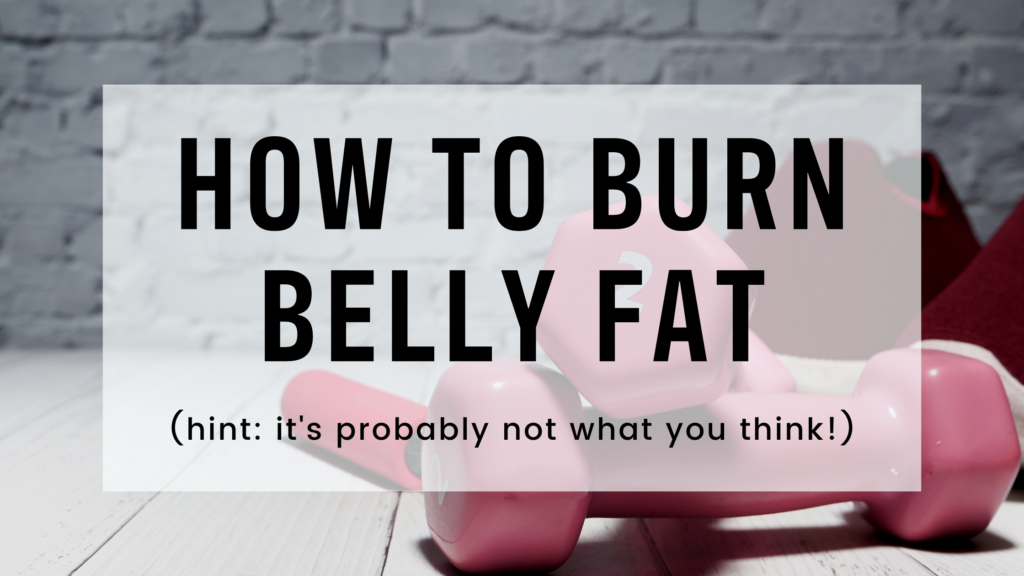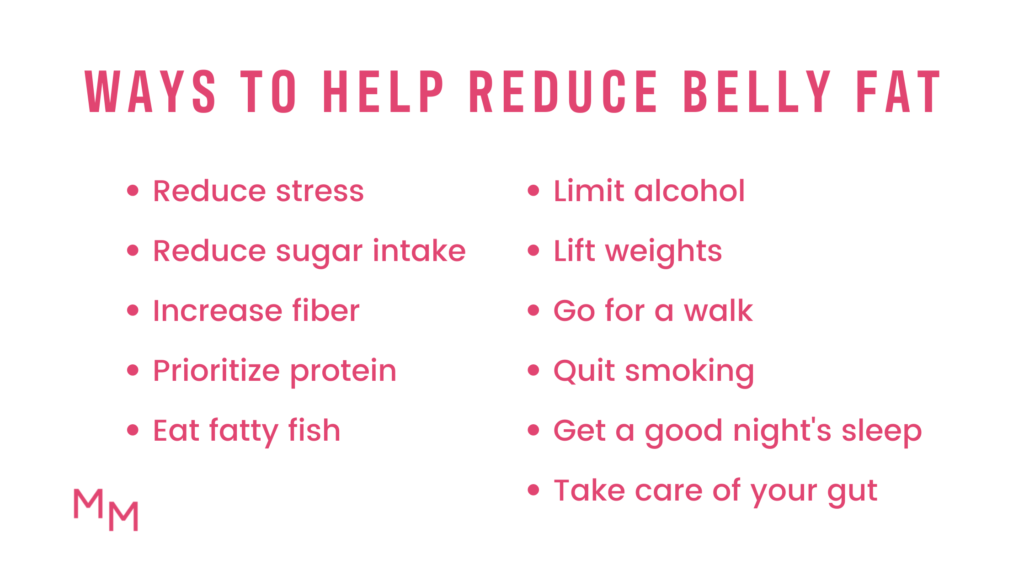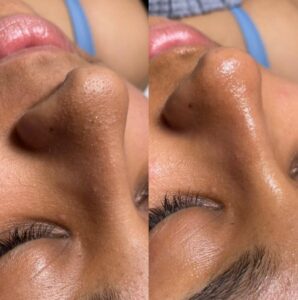
Who hasn’t asked this question? We all want the secret remedy! Stubborn belly fat can seem impossible to lose, driving supplement companies to flood your social media with ads for products that are “specially designed to target belly fat.” In reality, though, there’s no magic pill or supplement and no amount of crunches that can miraculously rid you of belly fat. The secret really isn’t a secret at all. If you are new around here, you will soon find out that the key to all weight loss is simply establishing consistent habits.
First things first – you need to establish what kind of belly “fat” you have. I say “fat” because it’s not always actual fat! Sometimes it’s excess bloat or an issue such as diastasis recti. We will touch briefly on those issues after we tackle the actual fat issue. When it comes to fat, we have two types: subcutaneous and visceral.
Difference Between Subcutaneous and Visceral Fat
Subcutaneous fat is the fat stored just below the surface of the skin. It’s the jiggle you can squish on your belly or the stuff that shakes when you wave like Forrest Gump. It’s normal to have this fat! Subcutaneous fat serves to keep us warm, protects our muscles and bones, and is a reserve storage of energy.
Visceral fat lies deeper within the abdominal walls and surrounds our organs. While visceral fat also serves to protect our organs, too much can be harmful. Research shows that people who have higher amounts of visceral fat also have a higher risk for type 2 diabetes, insulin resistance, heart disease, and certain types of cancer.
While subcutaneous fat isn’t as harmful as visceral, when it comes to reducing belly fat, we need to focus on reducing total belly fat. With that being said…visceral fat is easier to lose! Fantastic news for your health, but sometimes frustrating for those focusing on aesthetic changes. This is why it is important to realize that diet and exercise are so much more beneficial to our overall health, and not just for our outer appearance. Moral of the story is, just because you aren’t seeing an immediate change does not mean that what you are doing isn’t working! Stay at it!
Genetics also plays a huge part in how we store fat, and aging, especially for women (of course!), plays a major part as well. However, regardless of your age or genetics…
Here are 11 evidence-backed ways that you can reduce overall belly fat
1. Reduce Stress!
This is major when it comes to reducing belly fat and overall body fat. Prolonged increased cortisol (our stress hormone) leads to weight gain, weight loss resistance, insulin resistance, digestive problems, sleep disturbance…the list goes on, and if you’ve gone through Metabolism Makeover, you’ll know that I just hit on 3 of the 6 pillars of a healthy metabolism that cortisol impacts. Managing stress is crucial for overall health and reducing belly fat.
Stress can actually make you gain belly fat! High cortisol can both increase appetite and trigger belly fat storage. (1) To make this even more viscous…higher amounts of belly fat can also increase the amount of cortisol that we produce.
Of course, we can’t all live on a tropical island, so finding ways to reduce your stress needs to be a priority! I highly recommend Lyndsey Chambers, you can find her over on Instagram, along with both her “Manifest that Sh*t” and “3 for Me” challenges. Just so we are clear, I am talking about ALL stress! Even the kind that you may like. Your hustle mentality could be the reason you can’t lose that stubborn belly fat.
Read How Chronic Stress Impacts Your Adrenals too to better understand stress and find realistic ways to support your adrenals.
2. Reduce Sugar Intake
Specifically sugar-sweetened beverages. Many people have gotten better at reducing their sugar intake when it comes to food, but many are still consuming large amounts of sugar in their popular beverage options.
Even “healthier” options like many milk alternatives have added sugar snuck into them. A typical coffee from popular coffee shops has around 40 grams of added sugar. This is almost double the recommended amount for daily added sugar.
The point of this isn’t to scare you, but to encourage you to be mindful of sugar that can sneak its way into your diet through beverages like sodas, juice, milk alternatives, coffee and energy drinks. Especially since studies show a relationship between sugar intake and abdominal fat. (2, 3)
3. Eat More Fiber
Fiber really is underrated! Not only is fiber fantastic for your health, but it can also support your weight loss goals by making you feel more full, keeping you regular, and helping to slow the glycemic response of food. Hello, blood sugar management!
Studies have also shown that increased fiber intake over time is associated with decreased belly fat.
Unfortunately, many people do not meet their daily recommended amount of fiber. Since fiber is technically a carbohydrate, popular diet trends such as low-carb and keto decrease fiber intake even further. Here at MM, we recommend 5-15 grams of fiber per meal.
*Note: if you are someone who has low fiber intake, consuming high amounts of fiber too quickly can cause bloating and an upset stomach. Ease into it by aiming for 5 grams per meal and work your way up to 10-15 grams per meal*
Check out my post here for more about fiber and fiber sources!
4. Prioritize Protein
Protein is awesome when it comes to weight management because it promotes fullness, doesn’t spike blood sugar, and helps to maintain lean muscle mass!
Prioritizing protein at meals, and especially snacks, can help support your weight loss goals and support your efforts to decrease belly fat.
Click here for a list of 25 Foods To Pack In Protein.
5. Eat Fatty Fish
Okay, I know I said there is #1 food that can decrease belly fat, but there is some research that suggests that omega-3s found in fish may reduce visceral fat. (4)
Regardless of whether or not it directly reduces belly fat, it does help dig you out of the omega-6 hole that many Americans are typically in. Balancing out the overwhelming ratio of omega-6 with omega-3 can help to reduce inflammation, which is essential for weight loss.
Adding an omega-3 supplement or increasing fatty fish such as salmon, mackerel, sardines, tuna, and anchovies 2-3 times per week can improve overall health.
*Note: women who are pregnant, nursing, or TTC who may be worried about mercury content, this SafeCatch Ahi is a great choice for me!
6. Limit Alcohol
Alcohol can directly impact belly fat in a number of ways. For starters, alcohol is higher in calories than most nutrients. I know what you are thinking….No, we don’t focus on calories in MM, but considering alcohol isn’t an essential nutrient, it’s worth mentioning. Aside from this, alcoholic beverages tend to be high in sugar, can negatively impact sleep, AND can increase cortisol.
Again, I’m not here to tell you everything you shouldn’t do, I am here to arm you with the information you need to make your own choices.
Studies show that individuals who drink more than 2 drinks per day are associated with having a higher prevalence of both overall obesity and abdominal obesity than individuals who have 1 or less than 1 drink per day. (5)
7. Lift Weights
Increasing lean muscle mass has a major impact on your body composition and the shape of your body. Increased muscle mass also increases your basal metabolic rate (the amount of energy your body uses at rest). Remember how I said that fat is an extra energy storage? Increasing the amount of energy your body uses daily to simply be alive means using this extra energy source more.
Ladies, especially those of you who are postmenopausal, I cannot stress enough how beneficial resistance training is! 30 minutes of resistance training (a.k.a lifting weights) 2-4 times per week can drastically change your lean muscle mass and decrease body fat.
8. Go For A Walk
Having a sedentary lifestyle can greatly impact your overall health, and not in a good way. With that being said, walking is the most underrated form of cardio, and one of the most effective ways to lose belly fat. (5, 6)
150 minutes of walking or moderate aerobic exercise per week can decrease belly fat! This calculates out to about a 20-minute walk each day. This simple habit can not only decrease belly fat, but also improve mood and sleep….which also helps with belly fat management (see how this all works?!)
9. Quit Smoking
It’s 2022 so this should go without saying, but smoking is bad! If you need another reason to kick the habit…cigarette smoking (yes, vaping as well) increases abdominal fat (it’s science).
10. Get A Good Night’s Sleep
Low or poor-quality sleep can increase your risk of accumulating belly fat. Among other things, a lack of sleep impacts our ability to make decisions. When we are tired, we are less likely to move our bodies or prioritize nutritious foods.
Poor sleep makes losing weight exponentially more difficult, especially when it comes to that stubborn abdominal area. (7, 8)
Aim for a minimum of 7 hours of sleep a night.
11. Take Care of Your Gut
If you don’t know by now, our gut is amazing! Supporting a healthy gut has many health benefits and can help with weight maintenance.
You can improve your gut health by increasing fiber, eating fermented foods like kefir and kimchi, limiting artificial sweeteners (refer to my repost here), and taking a spore-based probiotic.
I personally use and recommend JustThrive, you can use code: NUTRITIONADDICTION for a discount!
Read more about How Probiotics Help With Belly Fat.
Now that we have established 11 things that you can do to help reduce belly fat, let’s take a look at a few other things that could be the problem.

Is It Belly Fat?
With all the above being said, sometimes our problem isn’t just belly fat, but bloat and/or diastasis recti (the culprit for the “mommy tummy”).
If it is mostly bloat that you are battling, all of the above will help, but here are a few more things that you can do:
- avoid sugar alcohols
- take a digestive enzyme
- drink the RIGHT amount of water (too much or too little can cause bloat)
- eat enough food…chronic restriction can cause bloat!
For many women, pregnancy can loosen the abdominal muscles causing them to separate and result in a “pooch” or “saggy” looking tummy. Reducing belly fat will help, but you aren’t going to have that pre-baby tummy unless you strengthen those muscles and bring them back together! For this, I recommend working with a physical therapist or a pelvic floor specialist, and not just your average personal trainer. This is crucial because many popular ab workouts will only make this separation worse. If you know you have diastasis recti or think you may have it, a few exercises to stop doing ASAP are crunches, unmodified planks or push-ups, most pilates-style movements, and yoga poses that cause your tummy to hang. With all that being said, I want you to know that mom-bods are hot and you should feel comfortable rocking whatever tummy you have!
To Sum It All Up
There isn’t one specific thing that you can do to decrease belly fat. There isn’t a “fat-targeted” supplement that you can take to magically rid yourself of your unwanted midsection. And no amount of crunches is going to scorch it off either.
However, implementing as many of these habits as you can, as often as possible is going to bring you the results that you want. If the above list seems overwhelming, start with #1 and #2! Decreasing stress and decreasing sugar are going to have a huge impact on your efforts to lose belly fat.
In short, abs really aren’t made in the kitchen…they are a product of consistency! If you need help establishing sustainable habits, sign up for Metabolism Makeover here, and let’s keep it simple!
-Your MM Coach Brianna a.k.a TheMomminNutritionist
Disclaimer: the education provided by Metabolism Makeover is for the purpose of promoting health and is not considered treatment for any specific condition, nor does it replace medical intervention or advice. For the treatment of a specific condition, we recommend consulting with your physician.



:quality(80))





